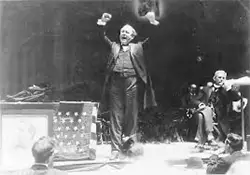William Jennings Bryan was one of the most famous orators in late 19th and early 20th Century America. Three times a presidential candidate, he is perhaps most well-known for embracing progressive causes such as the silver standard, Prohibition, and women's suffrage. 
He was born in Salem, Ill., on March 19, 1860. He studied at home for a time, then went to public schools, excelling in oratory. He graduated from Illinois College in 1881 and the Union College of Law two years after that. He won admittance to the Illinois State Bar and began practicing in Jacksonville, Ill. In 1887, he moved to Lincoln, Neb. He had married Mary Baird in 1884. They had three children together, Ruth and William, Jr., and Grace. Turning to politics, Bryan won a seat in the U.S. House of Representatives, in 1890, as a Democrat in a state that had been traditionally Republican. He served two terms in the House, lost an election for the U.S. Senate, and then returned to Nebraska to edit the newspaper the Omaha World-Herald. (He later published the Commoner, a weekly newspaper.) 
He was a populist who opposed protective tariffs when a majority of the country wanted them and a champion of Free Silver when big business and the Republican Party wanted to continue the Gold Standard. At the Democratic National Convention, Bryan gave one of the most famous speeches in American political history, the "Cross of Gold" speech, in which he delivered an impassioned plea for bimetallism, relying on both gold and silver as national monetary standards. (The policy at the time was adherence to the gold standard, matching a fixed quantity of gold to a standard amount of money.) He ran for President three times, as the Democratic Party's candidate in 1896, in 1900, and in 1908. He lost the first two elections to William McKinley and the third to William Howard Taft. The Democratic Party won the next presidential election, and the new President, Woodrow Wilson, appointed Bryan as Secretary of State. Bryan secured the Bryan-Chamorro Treaty, in 1914, giving the U.S. permission to build a canal across Nicaragua. He also brought 30 other nations to the negotiating table in order to head off a world war; this worked, for a time. He differed with Wilson on key points of foreign policy after the outbreak of World War I and then resigned, on June 9, 1915. Bryan remained in the public eye, campaigning for women's suffrage and Prohibition. He also published more than a dozen books and a great many pamphlets. A devout Christian fundamentalist, he published Sunday School lessons in several dozen newspapers across the U.S. for many years. One of his last famous acts was as an attorney taking part in the 1925 evolution trial of John Scopes, in Tennessee. He died on July 26, 1925, a week after the trial, which he won. He was 65. |
|
Social Studies for Kids
copyright 2002–2024
David White




